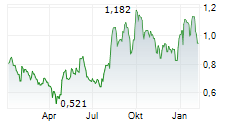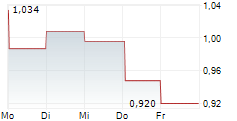
STOCKHOLM, SWEDEN / ACCESSWIRE / May 20, 2024 / Vicore Pharma Holding (STO:VICO)
- Buloxibutid improved lung function-measured by FVC-by over 200 mL from baseline at 36 weeks of treatment.
- The therapy was safe and well tolerated with no treatment-related serious adverse events.
- Biomarker analysis reflected an increase in plasma MMP-13 and a trend of decreased plasma TGFß1, consistent with the mechanism of action.
- The data were orally presented at the ATS International Congress and will be reviewed during a webinar hosted by Vicore on Wednesday May 22nd.
- Vicore plans to progress buloxibutid to Phase 2b development in the first half of this year.
Stockholm, May 20, 2024- Vicore Pharma Holding AB (STO: VICO), a clinical-stage biopharmaceutical company unlocking the potential of a novel class of drug candidates, angiotensin II type 2 receptor agonists (ATRAGs), announced positive final results from its Phase 2a AIR trial evaluating buloxibutid (C21) in idiopathic pulmonary fibrosis (IPF).
Vicore Pharma presented final data from the Phase 2a AIR trial at the American Thoracic Society (ATS) International Congress on Sunday, May 19th. AIR investigated the angiotensin II type 2 receptor agonist buloxibutid (100 mg taken orally twice daily) in a multicenter, open-label, single-arm trial in treatment-naïve patients with IPF for up to 36 weeks.
The trial was positive for both its primary and secondary endpoints, demonstrating excellent safety, tolerability, and efficacy. Over 36 weeks of treatment, buloxibutid improved lung function, measured by forced vital capacity (FVC), with a significant effect over expected decline in untreated patients. In untreated patients, a decline corresponding to approximately 180 mL over 36 weeks has been reported [1,2]. In patients enrolled in the AIR trial, FVC increased by an average of 216 mL from baseline to week 36, nearly 400 mL over the untreated trajectory (n=28, p<0.001). An improvement in FVC from baseline after 36 weeks of treatment was seen across all subgroups analyzed (geography, gender, and radiologic pattern). In addition, the majority of patients completing treatment since the last interim readout in May 2023 saw improvement in FVC from baseline at 36 weeks.
Buloxibutid was also safe and well-tolerated over 36 weeks of treatment with no drug-related serious adverse events and good GI tolerability. At weeks 12 and 24, the investigator completed a medical evaluation to assess the benefit/risk for the patient to continue in the trial without the use of standard of care therapy for IPF. At each of the two timepoints, 97% of patients had a positive benefit/risk and continued treatment. Further details will be presented at the Company hosted webinar on Wednesday, May 22nd.
"I'm very encouraged by the final results from the Phase 2a AIR trial and the impressive FVC improvement over 36 weeks of treatment with buloxibutid," said Professor Toby Maher, Keck School of Medicine at University of Southern California . "Both clinicians and patients should be excited about the potential of this drug to halt disease progression, restore lung function and improve outcomes for IPF patients in a safe and well-tolerated way."
Consistent with the upstream mechanism of action and the observed improvement in lung function, buloxibutid increased plasma levels of the collagenase MMP-13 and reflected a trend of decreased plasma levels of the profibrotic cytokine TGFß1 across the 36-week study. TGFß1 is known to drive multiple processes of IPF pathogenesis, while the collagenase MMP-13 is known to have fibrolytic activity with potential to degrade established fibrosis [3,4].
These results support advancement of buloxibutid into the Phase 2b ASPIRE trial. Vicore has collaborated with world leading clinical experts and patient advocacy organizations to design this randomized, double-blind, placebo-controlled, parallel group, multicenter Phase 2b study. ASPIRE will enroll patients on nintedanib standard of care and those not on standard of care, and the primary endpoint will be change from baseline in FVC at 52 weeks.
"The results from the AIR trial have exceeded our expectations and support the continued development of buloxibutid for IPF," said Ahmed Mousa, Chief Executive Officer of Vicore Pharma. "Taking together the biomarker data and the compelling improvement in FVC over 36 weeks, we believe that buloxibutid has disease modifying potential. This milestone brings us one step closer to our ambition of having a meaningful impact on the future standard of care for IPF patients."
Webinar presentation on Wednesday, May 22
Vicore will host a webinar including a Q&A session where Professor Toby Maher will present the final Phase 2a AIR trial results.
Date and time: Wednesday, May 22, 2024, at 10:00 ET/16:00 CET
How to join: https://ir.financialhearings.com/vicore-pharma-final-phase-2a-air-trial-data/register
The webinar and presentation will be available after the webinar at: https://vicorepharma.com/investors/events-presentations/
For further information, please contact:
Megan Richards, VP of IR, Communications, and Portfolio Strategy, tel: +1 978 269-4372, megan.richards@vicorepharma.com
Hans Jeppsson, CFO, tel: +46 70 553 14 65, hans.jeppsson@vicorepharma.com
This information was submitted for publication on May 20, 2024, at 08:00 CET.
About Idiopathic Pulmonary Fibrosis (IPF)
IPF is a progressive, lethal fibrotic lung disease that occurs primarily in middle-aged and elderly adults. The average life expectancy from diagnosis is 3-5 years. An increased prevalence of fibrotic diseases in combination with a rising geriatric population is driving future growth of the IPF patient population. IPF is a rare disease with an estimated prevalence ranging from 0.3-4.5 per 10,000[5]. There are two anti-fibrotic therapies on the market today. These drugs have limited efficacy and are associated with significant tolerability issues, causing a large percentage of patients to opt out of or not comply with their treatment. The majority of patients do not initiate treatment and those who do discontinue within less than a year on average[6]. With a growing patient population and limited treatment options, there is room for innovative and disease-modifying treatments.
About the renin-angiotensin system (RAS) and angiotensin II type 2 receptor (AT2 receptor)
The RAS is a hormone system that regulates several important physiological processes. In this system, the AT1 receptor is a well-established drug target with ARBs (Angiotensin Receptor Blockers), known for being effective antihypertension medications. In contrast, the AT2 receptor has been more elusive and difficult to study. The AT2 receptor is part of the body's repair system and is thought to be protective in several diseases connected to ageing and cell senescence, including idiopathic pulmonary fibrosis, chronic kidney disease and heart failure. Stimulating the AT2 receptor has been shown to be effective in combating disease in numerous animal models and clinical validation is well advanced in lung disease. With buloxibutid as the first-in-class highly selective small molecule AT2 receptor agonist (ATRAG) taken into clinical trials, the therapeutic benefit of targeting the AT2 receptor is becoming increasingly apparent. Vicore is developing buloxibutid for rare lung diseases and has a series of new ATRAGs in development for other indications.
About Vicore Pharma Holding AB (a clinical-stage biopharmaceutical company)
Vicore is an innovative clinical-stage pharmaceutical company unlocking the potential of a new class of drugs with disease-modifying potential. The company is establishing a portfolio in respiratory diseases, including idiopathic pulmonary fibrosis (IPF). Buloxibutid (C21) is a first-in-class orally available small molecule angiotensin II type 2 receptor agonist (ATRAG) recently completing a phase 2a study in IPF. Almee (an investigational medical device in clinical development) is a digital therapeutic based on cognitive behavioral therapy created to address the psychological impact of living with pulmonary fibrosis. Almee has received Breakthrough Device Designation from the FDA, reflecting its potential to have transformative impact. Using its unique expertise in ATRAG chemistry and biology, Vicore is further fueling its pipeline with several new therapies across additional potential indications.
The company's shares (VICO) are listed on Nasdaq Stockholm's main market. For more information, see www.vicorepharma.com
- Noble et al. Pirfenidone for idiopathic pulmonary fibrosis: analysis of pooled data from three multinational phase 3 trials. Eur Respir J. 47(1): 243-253 (2016)
- Richeldi et al. Efficacy and safety of nintedanib in idiopathic pulmonary fibrosis. Engl J Med. 370:2071-2082 (2014)
- Fernandez and Eickelberg. The impact of TGFß on lung fibrosis: from targeting to biomarkers. Proc Am Thorac Soc. 9(3):111-6 (2012)
- Cabrera et al. Delayed resolution of bleomycin-induced pulmonary fibrosis in absence of MMP13 (collagenase 3). Am J Physiol Lung Cell Mol Physiol. 316(5): L961-L976 (2019)
- Maher et al. Global incidence and prevalence of idiopathic pulmonary fibrosis. Respiratory research 22, 197 (2021)
- Dempsey et al. Adoption of the Antifibrotic Medications Pirfenidone and Nintedanib for Patients with Idiopathic Pulmonary Fibrosis. Ann Am Thorac Soc. 18, 7 (2021)
Attachments
Vicore Announces Positive Final Results from the Phase 2a AIR Trial Demonstrating Buloxibutid Improves Lung Function Over 36 Weeks in Patients with Idiopathic Pulmonary Fibrosis
SOURCE: Vicore Pharma Holding
View the original press release on accesswire.com


